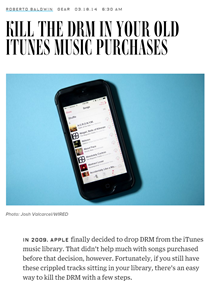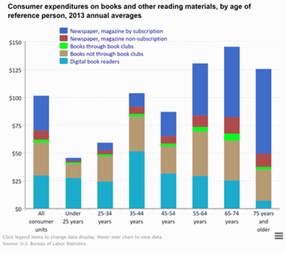 You can rid your iTunes collection of DRMed songs and replace them with legal music playable on countless devices.
You can rid your iTunes collection of DRMed songs and replace them with legal music playable on countless devices.
Check out this old Wired article for the how-to’s.
I myself haven’t the least trouble understanding why iTunes dropped DRM except for watermarking, if that counts. When people buy content, as opposed to knowingly renting, they want to own it for real. Is it really surprising that you can use Apple’s own software and services to de-DRM your iTunes collection?
And now—a friendly suggestion to publishers and retailers. What if publishers arranged for Amazon and others to sell both encrypted and DRM-free versions of the same book (even though there might still be watermarking of the latter)?
Booklovers could pay for DRM-free files of their already-made purchases, not just new ones, just as Amazon buyers of certain paper books can now pay for discounted digital versions. If I had my druthers, no payment would be necessary, just as in Apple’s case. But as a realist I am offering this compromise. Here are the major benefits to consumes and publishers:
1. Booklovers could build truly permanent collections in ePub, the industry standard, as well as other formats. Remember, permanence is one of the main allures of books as a medium. DRM steals control away from the buyer and prevents him or her from even reliably passing on purchases to children and grandchildren. It is threat to the culture of books. I wrote out similar sentiments years ago while blogging for Publisher’s Weekly. If anything, I feel even more strongly about this now. Few of even the best corporations will last decades and decades, and it is reasonable for booklovers not to have to rely on companies for continued access to beloved books, which their descendants might not to be able to enjoy at all without starting all over again.
 2. Large publishers have been keen on raising the prices of e-books, and this would reduce consumer resistance somewhat and provide new revenue during the transition to digital. The extra cash would help during the transition to the digital.
2. Large publishers have been keen on raising the prices of e-books, and this would reduce consumer resistance somewhat and provide new revenue during the transition to digital. The extra cash would help during the transition to the digital.
At the same time, publishers need to understand that the real future is digital, and that paper books compete not just against e-books but also other entertainment media ranging from Netflicks to video games.
It is pure folly to overcharge consumers for e-books while hoping they will stay within the reading fold. As it is, the average U.S. household as of 2013 spent only about $32 annually on recreational books and less than $120 on recreational reading of all kinds, such as magazines. No typo, alas. Just add $3.03 for book club-related purchases and $29.20 for nonbook club ones in the the breakdowns in the first column of the chart.
The way to increase the pathetic $32 is to offer more value and more choices to consumers, and DRM/noDRM options would help along with other progress, including an abandonment of the the delusion that e-book gouges can bail out traditional publishers in the long term.

































